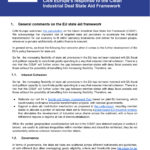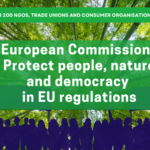
CAN Europe’s response to the Clean Industrial Deal State Aid Framework consultation
CAN Europe welcomes the consultation on the Clean Industrial Deal State Aid Framework (CISAF). We recognise the value of targeted state aid to speed up

CAN Europe welcomes the consultation on the Clean Industrial Deal State Aid Framework (CISAF). We recognise the value of targeted state aid to speed up

This article is authored jointly by Chiara Martinelli, Director at Climate Action Network (CAN) Europe, Juliana Wahlgren, Director at European Anti-Poverty Network (EAPN), Patrizia Heidegger,

The European Council is meeting in Brussels on 20-21 March, and are expected to discuss new ways to raise the EU’s own resources.
Public procurement in the EU accounts for 14% of GDP but remains underutilized in advancing environmental and social goals. Most contracts prioritize price over sustainability,
The EU’s next multiannual financial framework (MFF) will have to address a multitude of crises – from climate change and biodiversity loss to the cost

Brussels, 26 February 2025 — Today, the European Commission unveiled its flagship policy package, including the Clean Industrial Deal, the Action Plan for Affordable Energy

At Climate Action Network (CAN) Europe, we believe the upcoming Clean Industrial Deal must ensure that European industries lead in the transition to a sustainable

Written by Yelter Bollen, Policy expert Climate & Financing at Bond Beter Leefmilieu and Greg Van Elsen, Policy Lead on Clean Industrial Deal at CAN

Brussels, 29 January 2025 – The European Commission announced its Competitiveness Compass, setting a political direction for addressing Europe’s competitiveness gap. Climate Action Network (CAN)

Brussels, January 13, 2025 – Almost 270 civil society organisations, trade unions, consumer groups, farmers organisations, civil rights groups and environmental organisations representing millions of